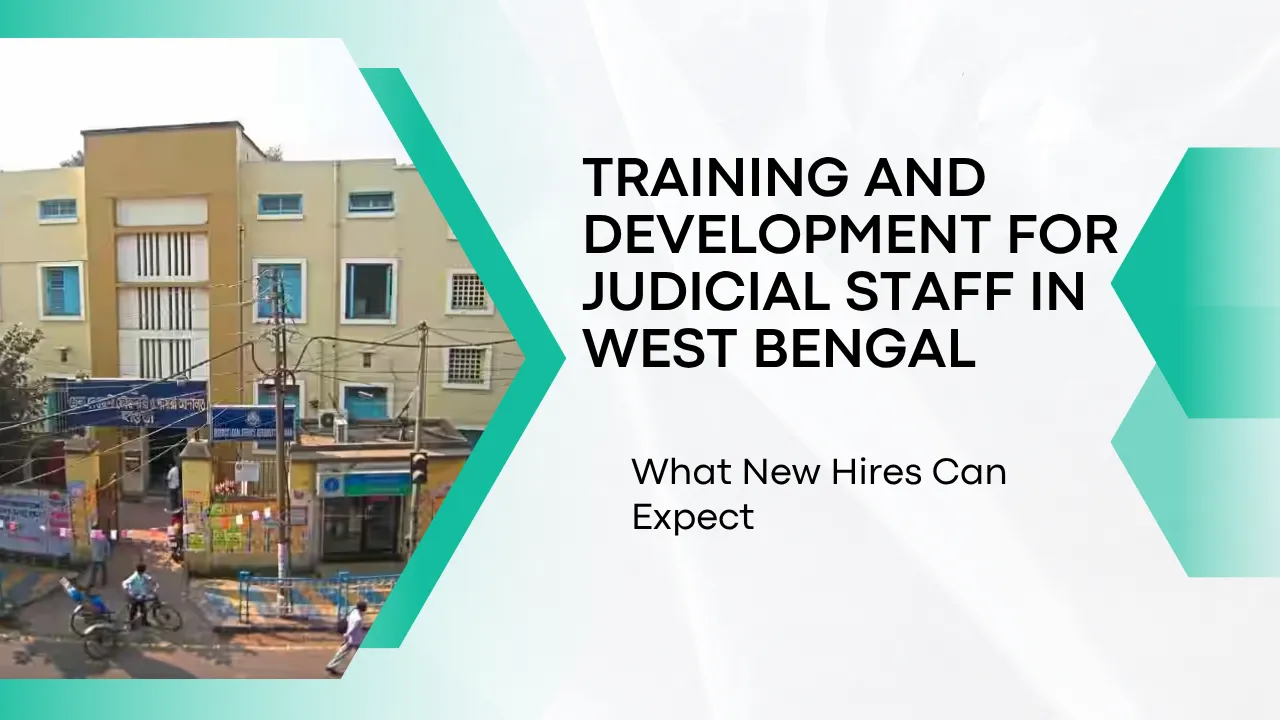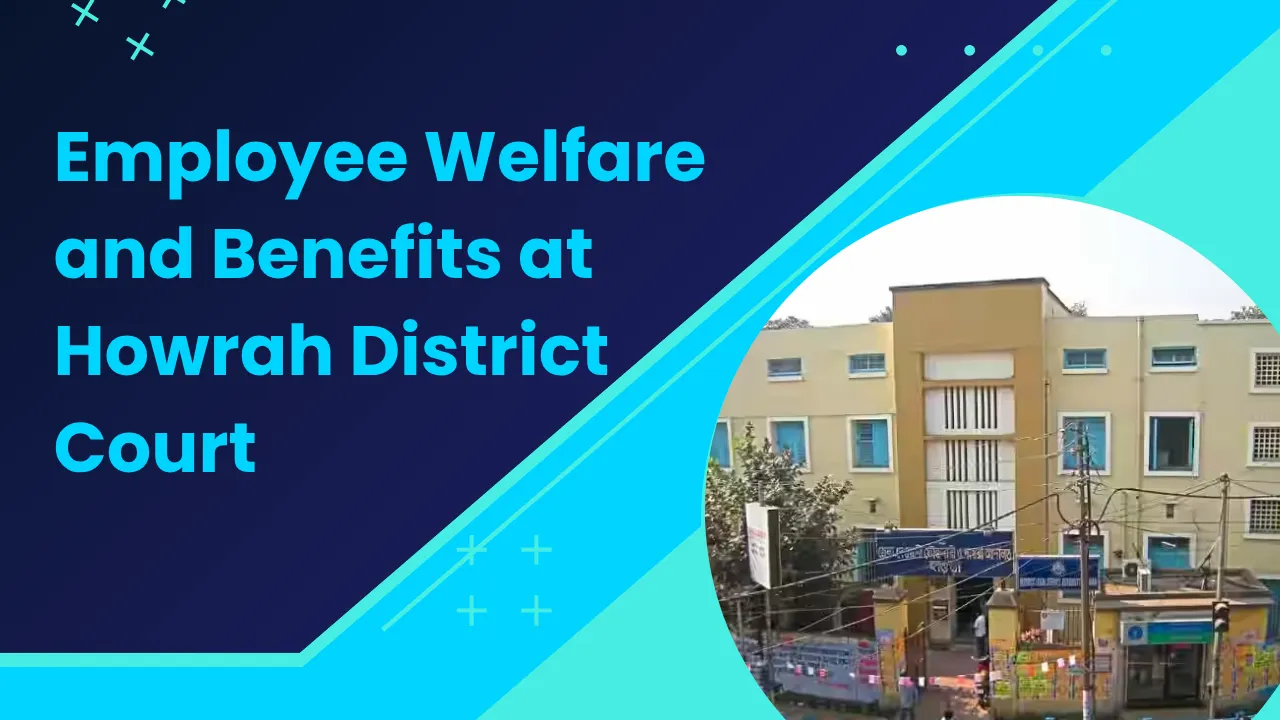Training and Development for Judicial Staff in West Bengal: Joining the judiciary is a prestigious opportunity—but it also comes with responsibilities that demand skill, discipline, and adaptability. For new hires at Howrah District Court and similar institutions in West Bengal, proper training is the key to transitioning from civilian life to the structured world of legal administration.
The state understands this need well. Through a robust system of Judicial Staff Training West Bengal, new recruits are guided through legal procedures, courtroom protocols, and the digital evolution of India’s justice system. Whether someone begins as a Lower Division Clerk (LDC), Stenographer, or Process Server, the training process is designed to build competence, confidence, and commitment from day one.
Judicial Staff Training West Bengal
The structured approach of Judicial Staff Training West Bengal ensures that employees are not only well-versed in traditional administrative practices but are also equipped to handle the demands of a modern courtroom. By integrating both legal education and digital proficiency, the state creates a workforce capable of supporting judicial officers, managing digital case files, and communicating effectively with litigants. This comprehensive training model supports long-term career development and significantly improves service delivery within the judiciary.
Overview Table
| Training Component | Description |
| Induction Program | Orientation on court hierarchy, conduct, and service rules |
| Role-Specific Sessions | Task-based training tailored for LDCs, stenographers, and process servers |
| E-Courts and Tech Skills | Hands-on use of digital court platforms like CIS and e-Filing |
| Soft Skills and Law Updates | Communication, gender sensitivity, stress management workshops |
| Practical Mentoring | Supervised experience, courtroom observation, and direct mentorship |
Induction and Foundational Training
Every recruit starts their journey with a detailed induction that blends classroom instruction with practical guidance. Training typically begins at WBJA or a regional center, followed by on-site learning at the local court, such as in Howrah.
This stage introduces new employees to the West Bengal judiciary structure, legal processes, and the public service code of conduct. It includes:
- Overview of judicial hierarchies and case flow
- Orientation on West Bengal Service Rules (WBSR)
- Training in treasury rules and financial documentation
- Guidelines for professional behavior, confidentiality, and public service ethics
Each cadre receives personalized training based on their job profile.
Role-Specific Training Modules
Each judicial role demands distinct competencies. Judicial Staff Training West Bengal ensures role-based development through structured modules.
For LDCs (Lower Division Clerks):
- Document drafting and record management
- Filing, case registration, and case diary maintenance
- Basic computer literacy and data entry using MS Office
For Stenographers:
- Legal transcription and shorthand accuracy
- Mastery of dictation tools and courtroom terminology
- Confidentiality and handling sensitive judicial documents
For Process Servers:
- Correct procedures for serving summons, warrants, and court notices
- Ethical communication and behavior with the public
- Documentation and return report filing
These practical modules ensure that each staff member performs confidently and correctly from the start.
E-Courts and Digital Training
A significant shift in the judicial ecosystem is the move toward digitalization. As part of Judicial Staff Training West Bengal, all recruits undergo technology training to align with the e-Courts initiative.
- Case Information System (CIS): Used for managing dockets, generating cause lists, and updating case statuses
- e-Filing Platforms: Learn to file documents digitally, manage e-payments, and track submissions
- Video Conferencing: Used in hearings, remands, and cross-district witness examinations
- Digital Records Management: Scanning, archiving, and accessing court documents securely
- Cyber Awareness: Protecting sensitive data from digital threats
Tech-savviness is no longer optional in the modern courtroom—it’s essential for speed and transparency.
Workshops and Continuous Learning
Beyond onboarding, staff are encouraged to evolve through regular training refreshers and skill-enhancement workshops.
- Refresher Courses: Cover updates in court procedures, financial rules, or changes in legislation
- Stress Management Programs: Especially important for those working under daily legal pressure
- Gender Sensitization Workshops: Educating staff on workplace ethics and preventing harassment
- Soft Skills Training: Boosting interpersonal communication, professionalism, and client interaction
- Specialized Software Seminars: Teaching tools like Ubuntu OS or transcription aids
These periodic initiatives ensure court staff remain adaptive and motivated throughout their career.
On-the-Job Mentorship
Learning doesn’t end in the classroom. A vital part of Judicial Staff Training West Bengal involves on-the-job mentoring from experienced personnel.
- Hands-On Guidance: New staff shadow seasoned employees to learn real-time workflow
- Supervised Assignments: Tasks are reviewed by supervisors like Sheristadars or Head Clerks
- Courtroom Observation: Especially useful for LDCs and stenographers to understand case proceedings
- Feedback Routines: Constructive reviews and tips from seniors help build expertise over time
This blend of training and mentorship ensures recruits don’t just understand the system—they become part of it.
Why It Matters
Training doesn’t just benefit individual recruits—it strengthens the entire judicial infrastructure.
- Ensures timely case management and reduces administrative errors
- Builds trust among citizens in the justice system’s transparency
- Reduces staff turnover by increasing employee confidence and clarity
- Promotes digital literacy, which improves efficiency across departments
In short, well-trained staff are key to a functioning, responsive, and people-focused judiciary.
Final Thought
The journey of a court employee begins with preparation—and Judicial Staff Training West Bengal offers exactly that. It empowers new hires with the tools they need to succeed, whether they’re drafting files, recording proceedings, or managing legal documents. This investment in people helps ensure the West Bengal judiciary remains efficient, transparent, and equipped for the future.
If you’re a new recruit or preparing to apply to the judiciary, be ready for an enriching experience. Embrace the training, ask questions, observe keenly, and engage with mentors. These early steps will shape a fulfilling, stable career in public service.
Call to Action
Are you joining the West Bengal judiciary or planning to apply soon? Start by learning about the training processes and available resources. Share this article with fellow aspirants or judicial staff to spread awareness about the rich training ecosystem awaiting them. Every great career begins with great preparation—make yours count.
FAQs – Judicial Staff Training West Bengal
1. Is the training mandatory for all new court employees in West Bengal?
Yes, all newly recruited staff across roles must undergo formal induction and skill-based training.
2. Where does the training take place?
Initial training is often conducted by the West Bengal Judicial Academy and supplemented by practical sessions at district courts like Howrah.
3. What if I lack computer knowledge?
Don’t worry—basic computer and court software training are included in the induction program.
4. Are workshops available after joining?
Yes, staff can attend workshops on legal updates, stress management, gender justice, and more.
5. Can I choose to skip any module?
No. All modules—including ethics, law procedures, and e-Court systems—are integral to your role and mandatory for full participation.












